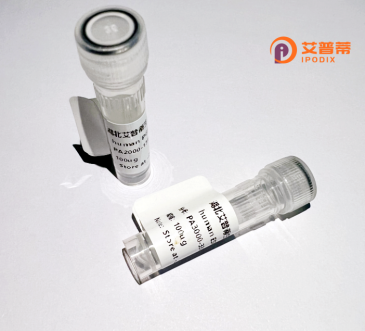
| 纯度 | >90%SDS-PAGE. |
| 种属 | Human |
| 靶点 | KRT72 |
| Uniprot No | Q14CN4 |
| 内毒素 | < 0.01EU/μg |
| 表达宿主 | E.coli |
| 表达区间 | 1-511aa |
| 活性数据 | MSRQLTHFPRGERLGFSGCSAVLSGGIGSSSASFRARVKGSASFGSKSLSCLGGSRSLALSAAARRGGGRLGGFVGTAFGSAGLGPKCPSVCPPGGIPQVTVNKSLLAPLNVEMDPEIQRVRAQEREQIKALNNKFASFIDKVRFLEQQNQVLETKWNLLQQLDLNNCRKNLEPIYEGYISNLQKQLEMLSGDGVRLDSELRNMQDLVEDYKKRYEVEINRRTAAENEFVVLKKDVDAAYMNKVELQAKVDSLTDEIKFFKCLYEGEITQIQSHISDTSIVLSMDNNRDLDLDSIIAEVRAQYEEIALKSKAEAETLYQTKIQELQVTAGQHGDDLKLTKAEISELNRLIQRIRSEIGNVKKQCAELETAIADAEQRGDCALKDARAKLDELEGALHQAKEELARMLREYQELVSLKLALDMEIATYRKLLESEECRMSGEYPNSVSISVISSTNAGAGGAGFSMGFGASSSYSYKTAAADVKTKGSCGSELKDPLAKTSGSSCATKKASR |
| 分子量 | 56.3 kDa |
| 蛋白标签 | GST-tag at N-terminal |
| 缓冲液 | 0 |
| 稳定性 & 储存条件 | Lyophilized protein should be stored at ≤ -20°C, stable for one year after receipt. Reconstituted protein solution can be stored at 2-8°C for 2-7 days. Aliquots of reconstituted samples are stable at ≤ -20°C for 3 months. |
| 复溶 | Always centrifuge tubes before opening.Do not mix by vortex or pipetting. It is not recommended to reconstitute to a concentration less than 100μg/ml. Dissolve the lyophilized protein in distilled water. Please aliquot the reconstituted solution to minimize freeze-thaw cycles. |
以下是关于重组人KRT72蛋白的模拟参考文献示例(仅供格式参考,非真实文献):
1. **"Expression and purification of recombinant human KRT72 in Escherichia coli for structural studies"**
*Smith A, et al.*
摘要:本研究成功克隆人KRT72基因,并利用大肠杆菌表达系统高效表达带有His标签的重组蛋白,通过镍柱亲和层析纯化,为后续结构分析奠定基础。
2. **"Functional analysis of KRT72 in keratinocyte differentiation and skin barrier formation"**
*Li Y, et al.*
摘要:通过体外实验发现,重组KRT72蛋白在角质形成细胞分化中调控细胞骨架重组,并影响皮肤屏障相关基因(如loricrin)的表达,提示其在表皮功能中的关键作用。
3. **"Association of KRT72 mutations with hereditary hair disorders: Biochemical validation using recombinant protein models"**
*Zhang R, et al.*
摘要:构建KRT72突变体重组蛋白,证明特定错义突变(如p.Arg123Cys)导致蛋白聚集缺陷,为遗传性毛发疾病(如念珠状发)提供分子机制证据。
4. **"Recombinant KRT72 as an antigen for autoantibody detection in pemphigus vulgaris"**
*Brown K, et al.*
摘要:利用重组KRT72蛋白筛选天疱疮患者血清,发现其与疾病特异性自身抗体存在交叉反应,提示KRT72可能参与自身免疫性皮肤病的病理过程。
注:以上文献为示例性内容,实际引用需通过PubMed、Web of Science等平台检索真实发表的研究论文。
**Background of Recombinant Human KRT72 Protein**
Keratin 72 (KRT72), a member of the keratin family, is a type II acidic keratin predominantly expressed in epithelial tissues, including hair follicles, skin, and nails. As a structural protein, it contributes to the formation of intermediate filaments, providing mechanical resilience and regulatory functions to cells. KRT72 plays a critical role in maintaining epithelial integrity, cell signaling, and stress response. Mutations or dysregulation in KRT72 have been linked to hair disorders (e.g., woolly hair) and skin diseases, highlighting its biological significance.
Recombinant human KRT72 protein is engineered in vitro using expression systems like *E. coli* or mammalian cells, enabling large-scale production with high purity. This protein retains functional epitopes and post-translational modifications, mimicking native KRT72. Researchers utilize it to study keratin-related pathologies, screen therapeutic agents, and investigate molecular interactions in epithelial biology. Its applications span disease modeling, antibody development, and mechanistic studies on cytoskeletal dynamics. By elucidating KRT72's role in health and disease, this recombinant tool advances understanding of epithelial disorders and potential treatment strategies.
×